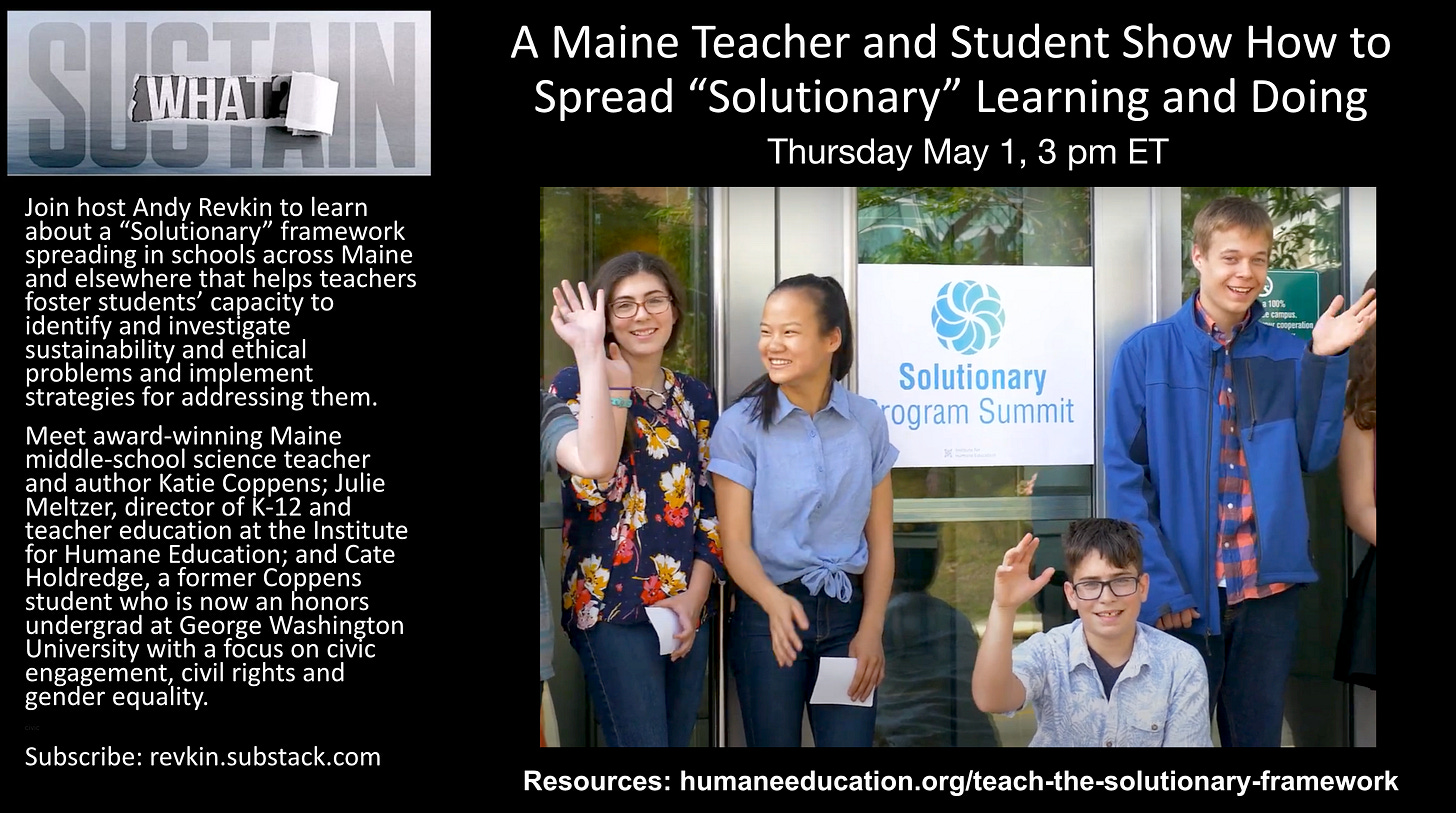A Maine Teacher and a Former Student Show How to Turn Classroom Inquiry into Societal Impact
A special Sustain What webcast on the "solutionary" framework for pursuing progress from the classroom to the community.
Please share this post with educators or anyone else eager to break big challenges into addressable questions and, ultimately, solutions.
I hope you’ll take time to watch this conversation I just had with two educators and a student committed to linking learning with positive societal and environmental outcomes. You’ll learn about a “solutionary” model for teaching that I explored here last year with Zoe Weil, the co-founder and president of the Maine-based Institute for Humane Education and author of The Solutionary Way: Transform Your Life, Your Community, and the World for the Better.
Among other activities, this organization works with school systems across Maine and in other states and countries to build students’ capacities to identify and break down big challenges into addressable components and then come up with ways to drive progress. Here’s the Maine program:
The framework and practices these teachers are learning resonate powerfully with my “Sustain What” effort to use constructive questions to dissect “complexity monsters” like the climate challenge and find ways you can use your skills and situation to cut climate risk or boost energy opportunity.
As I propose, which is more useful - yelling “climate emergency” or asking who is in a state of emergency and what factors are boosting danger? Here’s how these educators and students approach their work:
My guests were:
Katie Coppens is an award-winning science teacher at Falmouth Middle School and the author of more than a half dozen STEM-themed children’s books. In 2018 she participated in the Institute for Humane Education’s Solutionary Pilot Program, and her students shared their solutions to problems related to using lab animals to test products at a Solutionary Summit in Portland, Maine. Since then, the entire sixth grade at Falmouth Middle School has participated in solutionary learning efforts.
Cate Holdredge was a student in the original Maine pilot program for solution-based learning with the Institute for Humane Education and is now an honors student finishing up her freshman year at The George Washington University. She is concentrating in political science and public policy with a focus on civic engagement, civil rights, and gender equality. (You can see her here back in sixth grade!)
Julie Meltzer is the director of K-12 and teacher education at the Institute for Humane Education. Meltzer’s books include (as a co-author) Taking the Lead on Adolescent Literacy: Action Steps for Schoolwide Success.
Watch and share here on YouTube or on Facebook, Linkedin and X/Twitter.
For more on this teaching and learning framework, listen to my Sustain What conversation with Institute president Zoe Weil. We focused on her book, “The Solutionary Way," which lays out a systemic approach to problem solving that is a great fit for the wicked challenges of today’s world. I particularly love her focus on progress-making as a practice and mindset - not pursuit of a pre-conceived destination. A lot of problems face us as humanity tries to fit the aspirations and actions of some 9 billion people on this finite planet, but if even a fraction of those humans become humane solutionaries, I see a bright future ahead.
Zoe Weil on Forging “Solutionary” Paths to Progress
Here’s my relevant discussion from 2023 on “What is Education for in the Anthropocene?” My guests were Peter Sutoris, an environmental anthropologist and author of “Educating for the Anthropocene,” along with Radhika Iyengar, education director at Columbia’s Center for Sustainable Development, Zoe Weil, and Silas Swanson, a research staffer at the Electric Power Research Institute after years of climate action and activism that began at his high school in the Adirondacks and continued through his undergraduate years at Columbia University.
Here’s a nice reflection on accepting all facets of human life by Zoe Weil, who’s a neighbor (by Maine standards) and friend:
Cherishing Perfect and Imperfect Days
A brief missive on appreciating the good, and hard, in every day as another busy week unfolds
Four years ago, early in the genesis of Sustain What, I had a conversation with Nobel Peace Prize laureate Malala Yousafzai on education impact with a focus on girls. I think it’s still worth your time:
Malala on Girls, Education and a Clean Energy Future
Welcome to Sustain What - my new journalistic journey after a couple of decades at The New York Times and 33 years on the climate beat. Here, with your help, I'm building a cooler relationship between people, our planet and each other - one post at a time.









